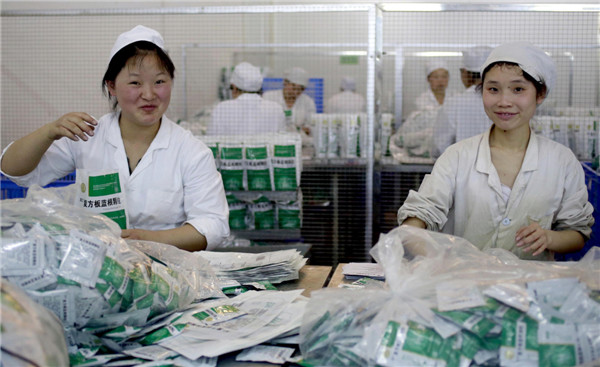Economic transformation bears fruit in Guizhou
Updated: 2013-05-21 07:50
By Yang Wanli and Yang Jun (China Daily)
|
|||||||||
Relocation
For Lei Hongmei, 24, whose family was moved to a new residential area when construction began on the industrial park, relocation not only provides much better living conditions, but also great business opportunities.
Lei's family lived in Xiaobao village for more than 60 years, but in 2009, when construction began on the industrial park, the local government built the Pearl River residential area to house relocated families.
 |
|
Workers in the packaging department of De Chang Xiang Co, one of the leading producers of traditional Chinese medicine in Guizhou province. Feng Yongbin / China Daily |
Each family in the village was given one or two apartments the same area as their previous homes. With a park, an outdoor exercise area, service centers and a supermarket, Pearl River is almost indistinguishable from modern residential areas in metropolises such as Beijing and Shanghai. Even better for the residents, the new homes were provided gratis.
"Most villagers used to live in adobe houses, some of which had no toilet or shower room," said Lei, who added that her parents have appreciated the move. "As they get older, they need to visit the bathroom more frequently in the evenings and that was really inconvenient in our old home."
Lei said about 30 of her relatives from Xiaobao, which has a population of around 2,800, have now moved to the Pearl River complex. In addition to being given new homes, the villagers were also compensated for the move: "Some of the families still have farming land in the villages, while others used their compensation to open small businesses," Lei said.
The local government provides free technical training courses for the younger and middle-aged villagers, focusing on the sort of work that will be available in the industrial park when construction is completed in 2020.
Lei has a strong sense of how to run a business. House decorations are in great demand as a result of the relocation of the village and, sensing an opportunity, she opened a lighting shop in Pearl River, selling European-style crystal chandeliers. A chandelier with a diameter of 60 centimeters sells for about 1,000 yuan, and Lei earns around 60,000 yuan annually from the business.
"I think the relocation of our village is what the government calls urbanization. It has improved the standard of living in the rural areas. More importantly, even though we are no longer farmers, we have other opportunities to make a living using our own abilities and the recently acquired skills, which really makes us the same as urban residents," she said.

 Michelle lays roses at site along Berlin Wall
Michelle lays roses at site along Berlin Wall
 Historic space lecture in Tiangong-1 commences
Historic space lecture in Tiangong-1 commences
 'Sopranos' Star James Gandolfini dead at 51
'Sopranos' Star James Gandolfini dead at 51
 UN: Number of refugees hits 18-year high
UN: Number of refugees hits 18-year high
 Slide: Jet exercises from aircraft carrier
Slide: Jet exercises from aircraft carrier
 Talks establish fishery hotline
Talks establish fishery hotline
 Foreign buyers eye Chinese drones
Foreign buyers eye Chinese drones
 UN chief hails China's peacekeepers
UN chief hails China's peacekeepers
Most Viewed
Editor's Picks

|

|

|

|

|

|
Today's Top News
Shenzhou X astronaut gives lecture today
US told to reassess duties on Chinese paper
Chinese seek greater share of satellite market
Russia rejects Obama's nuke cut proposal
US immigration bill sees Senate breakthrough
Brazilian cities revoke fare hikes
Moody's warns on China's local govt debt
Air quality in major cities drops in May
US Weekly

|

|








